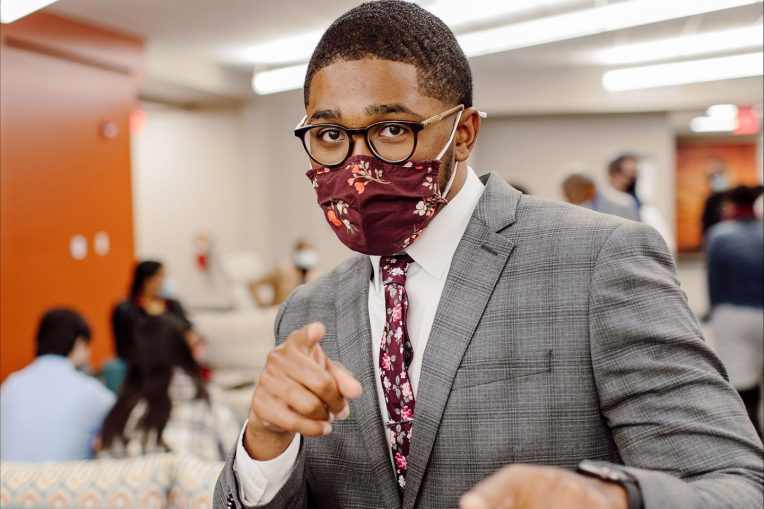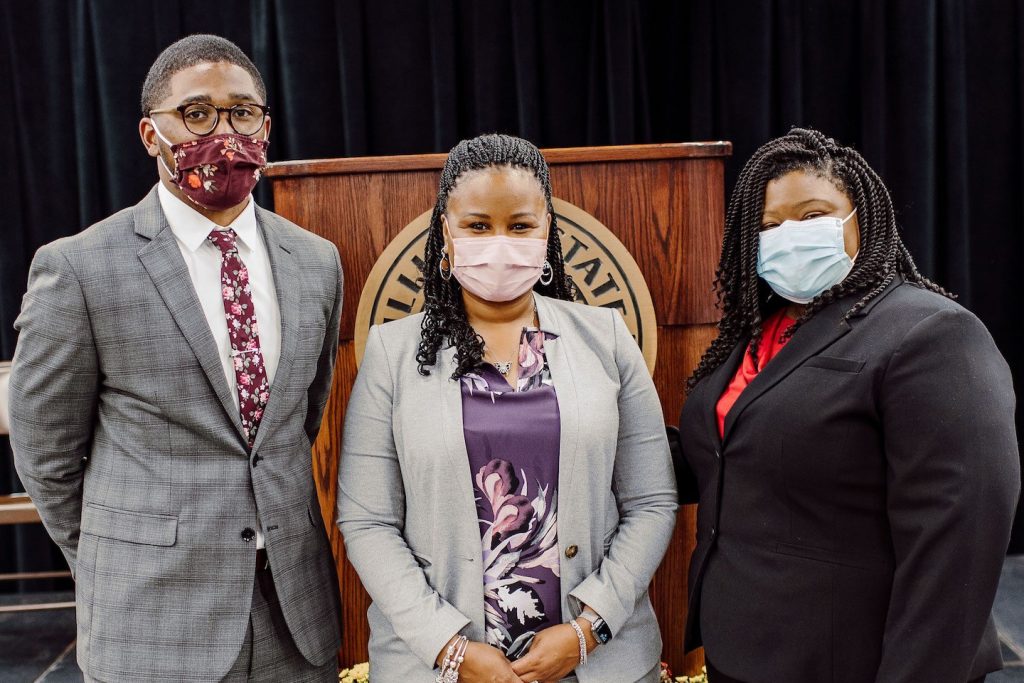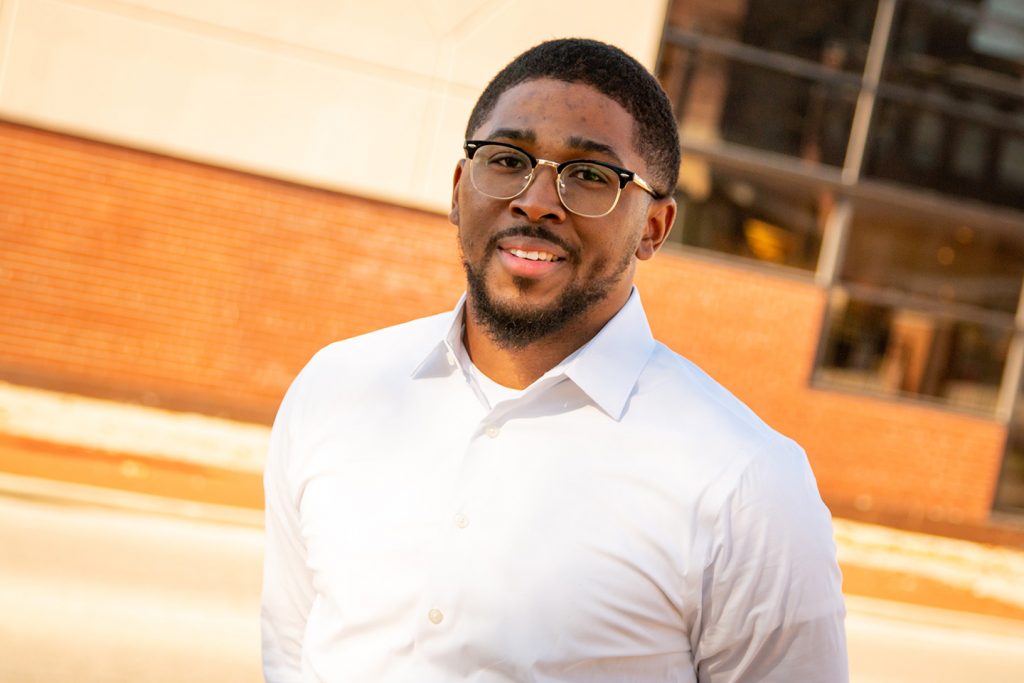Kwame Patterson has yet to have a “slow day” after two years at Illinois State. He was hired as a coordinator for Diversity Advocacy on January 6, 2020. Two days later, the University greenlit the creation of its Multicultural Center. Patterson was soon named the associate director of operations for the new unit.
“I had gotten wind of the potential for a Multicultural Center, but it was a surprise to start that work so quickly,” he said. “At the same time, it was some absolutely great news.”
He and the center’s director, Dr. Christa Platt M.S. ’09, served as the first and only staff members for several months. They led its creation and put together faculty and staff advisory groups on the project.
“They helped us develop our mission and our programmatic vision. They walked alongside of us as we did the hiring process for hiring additional staff in the space,” said Patterson, who began a Ph.D. with the Department of Educational Administration and Foundations in the summer of 2019.
“It’s been really beneficial just to be immersed in an experience with people who are aspiring to do some of the same things you are.”
Kwame Patterson
Student choices were also front-and-center for the development of the center. Four student organizations were relied upon throughout the process, including the Black Student Union, the Asian Pacific American Coalition, the Association for Latin American Students, and PRIDE.
When the pandemic hit two months later, work continued virtually. Patterson said they utilized GroupMe and Zoom to make collective decisions. This ensured students were integral to the look and feel of the new space, which had its official ribbon-cutting in October of 2021.
“It is fun working with students directly. They advocated for this space,” Patterson said.
“For us, it was important to be accountable to them and to have their voices be heard every step of the way. When people come and see this beautiful center, I remind them that students made decisions about everything, from the carpet, to the chairs, to the layout.”
Patterson said those lines of communication remain open. Following the ribbon-cutting, additional student-inspired podcast and greenery rooms began to come to life, as well. Through Patterson and Platt, a pattern of collaboration and listening has made the brand new center an intentional space and safe haven for many across campus.
“We are working on a healing unit in the Multicultural Center, not just for our students, but for our staff directly. Part of what I’m hoping for my impact to be is to get the story out about what we have done here, and for people to continue to build upon these efforts to make higher education more inclusive,” he said.
The work of putting together a meaningful space for underrepresented students at the University was informed by Patterson’s course work in EAF’s Leadership, Equity, and Inquiry (LEI) doctoral program. He was part of the charter cohort in the summer of 2019.
“For me, it has been transformative. I’ve engaged with faculty who have challenged me to kind of like decolonize my mind,” he said.
In particular, he points to the impact of Dr. Pam Hoff’s teaching on the Black radical tradition, a class he took during the summer of 2020.
“I think that course was healing during a painful time for Black men and women,” he said.
“I got a chance to learn a lot about myself and the history of what it means to be Black outside of slavery. We took a deep dive into the history of Black people, back to the ninth century. In going through the literature, I was able to learn a little bit more about myself.”
At the encouragement of another faculty member, Dr. Gavin Weiser, Patterson applied for and was selected into the Jackson Scholar Network. The national mentorship-based program supports the diversification of higher education faculty, which is still overwhelming tilted toward white instructors. While Demographic data lags three years, the National Center for Education Statistics (NCES) reports that a whopping 80 percent of full-time professors are white.
The mentor piece was particularly appealing for Patterson. In fact, the value of mentor relationships for Black male graduate students was the basis of his master’s thesis in college student affairs from Eastern Illinois University.
“I’ve found personally and through research that it’s important to have really good mentors, in higher education and in life, generally,” Patterson said.
“I eventually want to make a transition into faculty, and I think it’s important to have somebody on your side who has the blueprint and can guide you through making that transition or making those decisions.”
Weiser, who is the coordinator of EAF’s College Student Personnel Administration (CSPA) program, said he approached Patterson about the Jackson Scholars program because he’s already shown leadership potential.
“Before Kwame was an EAF doctoral student, he was a simply amazing mentor for our master’s students,” Weiser said. “Through his role in diversity and inclusion at Illinois Wesleyan University, he modeled the epitome of professionalism and related to our students extremely well. It’s clear he will contribute as much as he gains from the Jackson Scholar Network.”
He’s also appreciative of establishing a kinship with a cohort of participants from the Jackson Scholar Network.
“It’s been really beneficial just to be immersed in an experience with people who are aspiring to do some of the same things you are,” he said.
A week before the ribbon-cutting at the Multicultural Center, the staff undertook the solemn task of planning the memorial services for Jelani Day. Like Patterson, Day was a Black male graduate student at the University. He went missing in late August of 2021, and his body was recovered from the Illinois River in September. While the cause of death was ruled a drowning, questions remain about the circumstances surrounding the case.
“The memorial service was something that needed to happen at ISU, obviously,” Patterson said.
“Our community has felt the loss of Jelani, and people are still extremely frustrated with the lack of information that we are receiving. When it came to planning the celebration of his life, we decided we were going to move how the family moves and support them in that way.”
While Rev. Jesse Jackson Sr. and other activists have called for separate investigations, Patterson said they received positive feedback for the time and care that went into planning the service.
“That was the most important thing for us.”
Patterson has shown he’s capable of effectively serving communities, and his abilities will continue to grow through his time with EAF and the Jackson Scholar Network.
The still-fresh paint on the Multicultural Center’s walls is a reminder that this work at Illinois State is in its infancy.
But the University is in good hands with a genuine and dedicated leader in Patterson.



